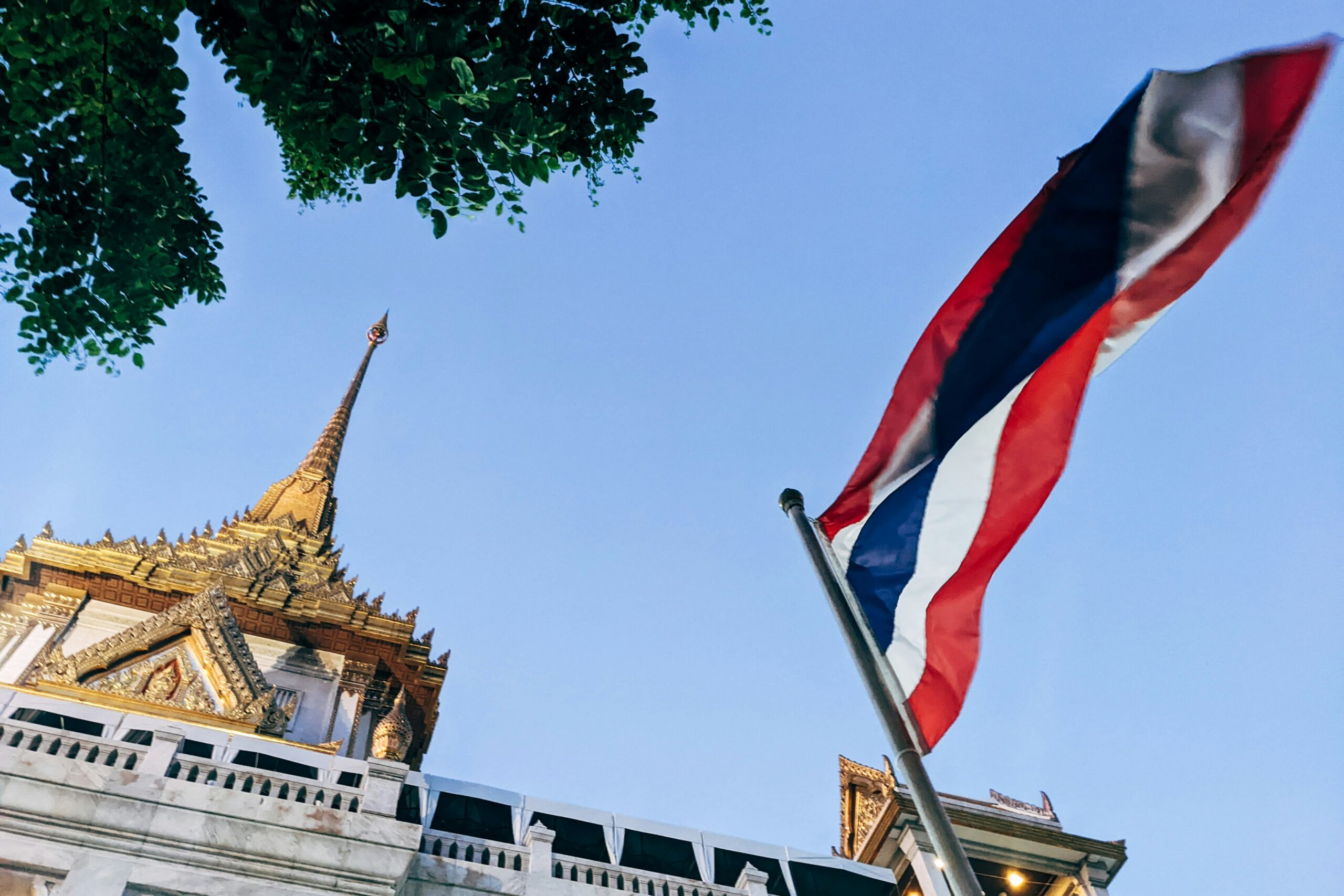Thailand’s Ideological Divide and the US-China Rivalry
In Thailand’s democratic history, no foreign influence was ever as impactful in shaping the country’s political structure as that of the United States. Bilateral relations peaked during the anti-communist alliance during the Vietnam War. But despite Thailand’s geopolitical neutrality since then, the Sino-US rivalry is being recontextualized under the country’s ideological divide.
Thailand’s 2023 election led to an unprecedented victory for the progressive Move Forward Party (MFP), which won 37% of the votes. It was a significant turn considering the country’s historical rules of conservative and junta parties. In the end, the MFP wasn’t able to form a government, as the once anti-junta Pheu Thai – who came in second with 28% of the votes – joined the ruling junta-conservative parties.
Nevertheless, the MFP’s electoral victory indicates a clear ideological shift among Thai voters and a progressive turn against the firmly established military-royalist ideology, concurring with the rising tension of the US-China rivalry.
Unlike the post-WWII era, when Thailand and the US found a common cause against communism, after the Vietnam War, Thailand pursued a more or less neutral course, sometimes referred to as Bamboo diplomacy. This policy trend is characterized by its practicality rather than alliance-building.
In recent decades, this has resulted in inconsistent decisions. Such as abstaining in the 2022 UN resolution condemning Russia’s invasion of Ukraine, while voting the end the war the year later. The abstinence in 2022 was suspected to be due to President Vladimir Putin’s expected participation in APEC in Thailand later that year.
Similarly, Thailand has been silent in other geopolitical conflicts, such as the 2020 Hong Kong protest. However, despite the government’s nonaligned policies on the world stage, the country’s political discourse has increasingly been polarized along geopolitical fault lines.
While Thai pro-democracy movements and activists call for a more vocal stance against undemocratic practices on the world stage, the political establishment has remained mostly aloof as both ideological factions still largely agree on impartiality towards allegiant commitment towards the US-China rivalry.
US-Thai Relations
After the Cold War alliance, the US-Thai diplomacy is reversed to align with its overarching strategy in the Asia-Pacific. The Free and Open Indo-Pacific Strategy (FOIP) has since led to the US’s public criticism and condemnation of undemocratic events in Thailand, such as the 2014 coup. This avocation might seemingly align with the goals of the Thai democratic and progressive movements, but the US is still far from being a supportive or reliable ally.
It is questionable whether the US will stick to its moral principles if it can find geopolitical purpose in the Thai ruling establishment. The Thai-US alliance during the Vietnam War, for example, provides a vivid history of the US’s willingness to work with Thai autocracies. Washington, in order not to jeopardize its alliance with Bangkok, was notably silent during both the uprising of 14 October 1973 and the massacre of 6 October 1976. It’s also questionable if US pro-democracy advocacy will be extended to more contentious topics like the lèse majesté law.
In recent years, the US, through its embassies, has actively participated in Thai progressive discourse, such as itscelebration of Bangkok Pride month in June 2023, and its mural symbolizing feminist and LGBTQ+ activism in its Bangkok embassy. On the other hand, it has been tactically avoiding direct involvement with the Thai pro-democracy movement, which is due to it being antagonized in Thai politics. The lèse majesté complaint against Ambassador Glyn Davies in 2017 for example, shows the Thai conservatives’ targeting of US presence in Thailand.
Moreover, the US’s close historical ties with authoritarian military regimes, such as Plaek Phibunsongkhram’s 2ndadministration (1948-1957) or Sarit Thanarat (1958-1963), remain a bad memory to both Thai progressives and the FOIP strategy. As such, skepticism towards the US from both ideological sides persists.
This mutual distrust leaves the US little room to advance its diplomatic and public relations with either side. It can’t simply support the military establishment as it would betray its own FOIP policy which aligns with the progressives. However, it can’t support the pro-democracy movement either as it will be targeted by the conservative establishment.
Furthermore, without clear geopolitical incentives, the consensus on impartiality will encourage any political demography to stay distanced from superpower nations and geopolitical interactions. This creates little incentive for the US to pursue either ideological faction as the Thai’s strong stance on neutrality will not yield any geopolitical advantages for the US.
In this sense, if the US is satisfied with its stable yet cold relations with Thailand, its pro-democracy rhetoric on Thailand will only be beneficial as virtue signaling on the world stage.
Sino-Thai Relations
As the Thai Chinese comprise more than 10% of the Thai population, ethnic-cultural becomes an integral part of Thai-China diplomatic and economic relations. Additionally, billionaires like the Chearavanont family of the CP Group form backchannel diplomacy to China, while Chinese tourists have been contributing to the national income of the country.
PM Srettha Thavisin’s participation in the 3rd BRF in October signals an openness to strengthen Thai-Sino economic collaborations. The proposed Land Bridge project, which will ink the Andaman Sea to the Gulf of Thailand, is poised to be the first landmark project of the Belt and Road Initiative (BRI) in Thailand.
Previously since 2014, increasing security ties with China have put Thailand closer to Beijing’s ring of influence following the US’s diplomatic withdrawal from Thailand.
Unlike the US, China follows its non-intervention policy, which results in its lack of engagement in the Thai political discourse. This, however, does not reduce public anxiety towards China’s political presence in Thailand.
For example, the controversial retraction of Thai PBS’s interview with the Taiwanese foreign minister, and the outrage following the PM’s alleged idea of hosting Chinese police highlight a deep-seated wariness about Beijing’s influence and political autonomy in Thailand.
Issues like the housing crisis and excess influx of Chinese goods also add to skepticism towards bilateral economic relations.
But despite its non-interventionism, China is still highly politicized in Thai political discourse, especially being criticized by the pro-democracy movement.
This stems from its own non-intervention policy, which normalized its relations with the junta government post-2014 coup, despite global condemnation both at home and abroad. Moreover, the pro-democracy movement also finds ideological solidarity with opposition to Beijing’s single-party regime, notably culminating in the “Milk Tea Alliance” in 2020.
Despite Thailand’s special cultural and ethnic ties to China, it’s unlikely that this relationship will help convince the Thais on geopolitical matters. Therefore, the Thais’ skeptical perception of Thai-China relations and the ideological disagreement from the Thai pro-democracy movement tend to reinforce Thailand’s preference for geopolitical impartiality.
Thailand’s conviction in impartiality doesn’t come only from the lack of geopolitical incentives, and the resulting diplomatic benefits, but also from the perceived unreliability of both world superpowers. This skepticism from both ideological sides presents a diplomatic deadlock for both China and the US.
While the growing ideological divide among the Thais may mirror the rhetoric of the US-China rivalry, they are unlikely to affect opinions on geopolitical strategy. This, however, will affect the Thai government as they will be pressured to preserve the US-Sino diplomatic standoff on Thailand’s neutrality.
With Thailand tilting towards China in the recent decade, Pheu Thai’s quasi-civil government can pave the way to rekindle Thai-US relations. But doing so, it will need to challenge the systemic political oppression of the pro-democracy movement and restrain imports of military supplies from China.Otherwise, careless diplomacy will destabilize Thailand’s long-held geopolitical neutrality and worse, divide further the already polarized Thailand.
Photo by Markus Winkler on Unsplash

